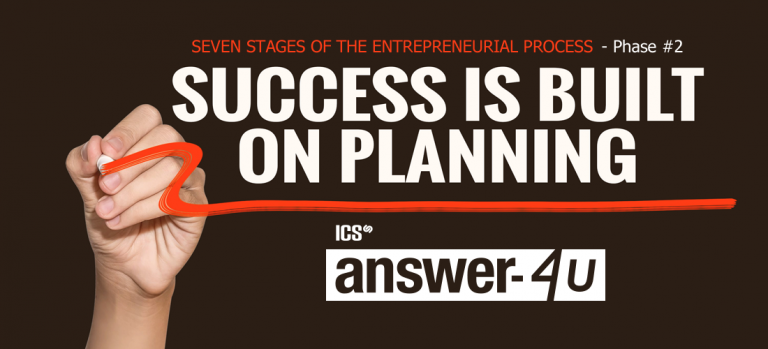
After completing phase one of the entrepreneurial process (investigation and research) and deciding you want to move ahead with your idea, you now need to move into the crucial second phase – planning.
When a project goes wrong, plenty of critics often come out of the woodwork, proclaiming their own version of “If you fail to plan, you are planning to fail!”, a quote often attributed to Benjamin Franklin, one of the US founding fathers.
It’s a fairly trite phrase that’s usually rolled out when hindsight is available in 20:20, but while no self-respecting entrepreneur would ever ‘plan to fail’, they certainly can fall down in the early stages of an enterprise if they don’t invest enough time in planning.
To give your new business the best chance of success there are some key pieces of work that entrepreneurs need to do before launch.
1. Develop a Business Plan

Although this is listed here as item number one, your business plan needs to encapsulate all the work at this stage. Much as all roads are said to lead to Rome, all elements of a new enterprise should be linked to your business plan.
Your plan needs to cover at a minimum your business structure, objectives, strategies, branding, sales, marketing and financial forecasts. It will also help you give a concrete form to your idea, which will help you identify any areas that need additional work.
There are various business planning resources available online such as the Start Up Donut website.
Your business plan needs to include as much detail as possible, because in many ways it is your business handbook. If you need help developing it, you could look for a mentor from among your business acquaintances, ask for support from a local business network, or seek advice through your local Chamber of Commerce.
2. Choose your Suppliers

During phase one you will have identified areas where you need input from another company or individual, such as a manufacturer, a distributor and professional support.
Now is the time to firm up those relationships, putting into place contracts with detailed service level agreements (SLAs). SLAs are particularly crucial in areas where you might need urgent help in a crisis, such as your computer system going down.
The range of suppliers you need to have in place could include:
- Professional services – legal, financial, banking, accountancy and insurance
- Systems support – IT, telephony, HR, payroll and recruitment support
- Facilities – estate agent, office servicing and, if you own the property, utilities
- Production – manufacture, warehousing, distribution and logistics support
- Marketing – a sales team and web, public relations and marketing support
Remember that the British Chambers of Commerce offer links to support in many of these areas, and you can also talk to your local Chamber. Make sure you get testimonials about any potential supplier so you can be sure they are right for you, and ask others for recommendations – if you have a good accountant, for instance, they may well be able to refer you to a reliable finance broker.
3. Test and Protect your Product
As part of your planning you need to ensure your product meets all the relevant safety testing requirements and has the necessary certification and licensing. The UK government has published some helpful guidance on this. It is also wise to look back at the issue of protecting your intellectual property as this must now be finalised.
4. Firm up your Legal Structure and Financials
It’s crucial in this planning phase to completely understand the financial structure of your company, your costs, expected revenue, investment required, breakeven point and potential for profit. This is not only key so that you remain on top of things, it will also be essential if you’re looking for a loan or investment.
The HMRC has a neat little film on how to forecast your business finances and why this is important to help identify any gaps in your planning, or times when cash may run short and you need to build in contingency. The film covers how to develop a sales forecast, a profit and loss forecast, and a cash flow forecast. Matching your performance against the forecast is essential in managing your business successfully.
You also need to finalise the legal structure of your company at this point – this may be as simple as registering as a sole trader with the HMRC, or you may need support from a solicitor and/or accountant to draw up a partnership agreement or form a limited company.
5. Get your Staff On Board

If you need staff for your business, you need to make sure you hire the right people for the roles.
Small businesses can get specialist recruitment advice from Jobcentre Plus including help with designing job vacancies, a contact to advise you on the local labour market and an aftercare service for once recruitment is complete.
If you have a specialist role, such as a web and online manager, you could also approach a specialist recruitment agency for that industry or even a head hunter. You should be able to find these online.
Whether you take on permanent or temporary staff, make sure you are up to date with employment legislation or get yourself some external support to ensure you meet all the requirements. Revisit the UK government guidance you looked at in phase one, which covers issues such as the national minimum wage, the legal right to work in the UK, employment insurance and employment contracts. This really is an area where you must not go wrong as mistakes can come with heavy costs and penalties.
If you don’t plan to take on any staff at this point, remember to have a contingency in place that you can implement if anything puts you out of action unexpectedly.
6. Develop your Branding

Branding isn’t just a logo – it’s what encapsulates what you stand for and what you offer. Your market research should help with developing your branding, in that you should now know what your potential customers think is important.
Marketing Donut offers ten top tips for small business owners who want to build a brand, and trade media such as Marketing week can be useful for finding both ideas and details of agencies if you’d like to contract some external support.
Your branding will often make the difference between whether someone chooses your product or service or not – it’s not a ‘nice to have’, it’s an essential part of your business and identity.
7. Acquire Funding
Once you’ve done your financial planning, you will know whether you need a loan or outside investment. You will also know how much you need and when you will need it, the payment terms you can afford and what collateral you can offer if required.
Once you have your proposition in place, either go to the market to find a lender such as a high street bank, or you could check the National Association of Commercial Finance Brokers’ online platform findSMEfinance, which has been created to enable small businesses to gain access to commercial finance via an approved independent UK broker.
8. Make Sure you have Everything Covered
When you think you’ve done all the planning you need to, a good idea is to run through a ‘day in the life’ of your business and how it will run – including all the elements that may affect it.
For example, think about what will happen when you receive an order. Do you have the packaging and labelling you need? Is there a way to deliver it? What will you do if your usual supplier goes under? What happens if the product is damaged in transit or in some way injures a customer? Are you insured? Do you have customer service callers in place? Do they have a database and phone system to use? And so on... Thinking it through in this way should enable you to pick up on any areas you haven’t yet covered in your planning.
You should now be ready to move on to phase three - start up and launch.
Save
Categories
- 24 Hour Call Answering Service (6)
- After Hours Call Answering (5)
- After-Hours Call Answering Service (6)
- Answer-4u (11)
- Artificial Intelligence (5)
- BPO (5)
- Business (66)
- Business Grants (3)
- Business Growth (4)
- Business Owner (6)
- Business Strategy (2)
- Call Diversion (6)
- Call Handling Service (13)
- Charity (2)
- Christmas (6)
- Customer Experience (5)
- Customer Satisfaction (3)
- Customer Service (26)
- Customer Services (8)
- Decision Making (3)
- Diary Management (3)
- Digital Marketing (16)
- Disaster Recovery (5)
- EntrepPhase (7)
- Entrepreneurs (7)
- Finance (2)
- Funding (3)
- HR (6)
- Infographic (1)
- Inspiration (2)
- Leadership (4)
- Marketing (15)
- Marketing Strategy (2)
- Networking (2)
- Other (4)
- Outsourcing (14)
- Phone Etiquette (9)
- Productivity (6)
- Property Management (3)
- Recruitment (7)
- Self Improvement (2)
- Small Business (14)
- SME (4)
- Staff Training (2)
- Start-Up (9)
- Technology (3)
- Telephone Answering (15)
- Time Management (4)
- Virtual Assistant (3)
- Virtual Receptionist (12)
- Workforce (9)
- Working Environment (9)
- Workplace (28)





